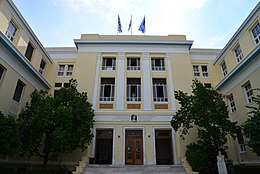
Athens University Of Economics And Business (AUEB)
Location: Athens, Greece
Contact: John Pavlopoulos (annis@aueb.gr)
The UNESCO Chair on Digital Methods for the Humanities and Social Sciences has been recently established in the Department of Informatics, Athens University of Economics and Business (AUEB), with the mission to advance the digital transformation of the way of working in the Humanities and the Social Sciences within an extensive web of international collaborations under the auspices of UNESCO. It is conceived as a hub of interdisciplinary collaboration between five laboratories and the MSc in Digital Methods for the Humanities within AUEB, and universities, research centers, memory institutions, networks, research infrastructures and private organisations. In particular, the Chair brings together high-calibre research groups with extensive expertise in knowledge representation and management, digital curation, AI and natural language processing, information extraction and integration, machine learning, sentiment analysis, graphics and 3D visualisation, and in applying digital methods in cultural heritage and humanities. Chair members have leading roles in the development of the national infrastructure APOLLONIS and in advanced international endeavours, such as Ithaca and PRESIOUS.
Services currently offered by the infrastructure:
AUEB conducts widely recognized research in AI and language technology, data management, ontologies and knowledge representation, graphics and visualisation, statistics and data science, political economy, and economic history, while it runs a MSc Program in Digital Methods for the Humanities, currently unique in Greece. The laboratories affiliated to the UNESCO Chair (Information Systems and Databases Laboratory; Information Processing Laboratory; Theory, Economics and Systems Laboratory; Laboratory of Applied Statistics, Probability and Data Analysis; Economics Laboratory) provide space, equipment, software, online services, and data resources. Affiliated to the UNESCO Chair and the MSc Programme are groups of the Department of Informatics, such as:
- The Natural Language Processing Group, developινγ algorithms, models, and systems that allow computers to process and generate natural language texts (question answering, natural language generation from structured data, text classification, information extraction and opinion mining, natural language processing tools for Greek, natural language processing in digital curation, machine learning).
- The Computer Graphics Group, focusινγ on Shape Analysis and Geometry Processing, Interactive Rendering Algorithms, Lighting Optimization, Display Algorithms and Frame Buffer Techniques, Sampling and Compression.
The MSc in Digital Methods for the Humanities offers courses such as: Programming in Python; Information and knowledge representation and organisation; Management, curation and publication of digital assets; Data management; Applications of Digital methods in the Humanities; Language technology; Digitization technologies, techniques and applications; Interactive design and multimedia; Electronic lexicography; Design Thinking and Innovation; Geographic Information Systems and Spatial Analysis in History and Archaeology; Special Topics in Digital Methods for the Humanities; Digital Technologies in papyri and manuscripts; Legal Issues in Information and Digital Media Management; Basic Statistics.
Moreover, innovative DH projects, such as Block 15: A Virtual Journey, are currently implemented at AUEB, while training, awareness and community building activities to promote the use of digital tools for Humanists, such as the open source tool Recogito, developed by the Pelagios Network, are offered.
Offering
In the context of this TNA, the UNESCO Chair on Digital Methods for the Humanities and Social Sciences will offer mentoring in and an environment for experimentation with advanced digital methods in the humanities. Specifically, the Chair offers workshops and welcomes residences for work mostly in the following areas: ontology-driven information modeling, knowledge organisation and knowledge graphs, collaborative spatio-temporal annotation, multimodal information extraction, 3D photogrammetry and visualisation. Residents are introduced to workflows and tools developed, or adopted and refined, by Chair members and work on running projects or bring their own data, within compatibility constraints.

